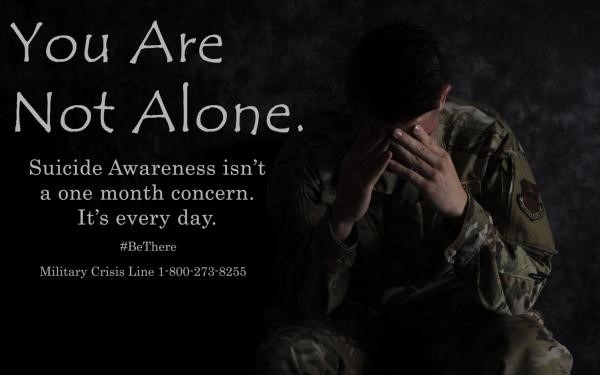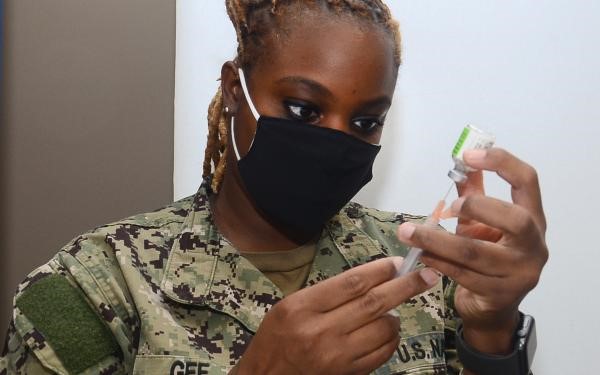Thursday Three is Here!
October 01, 2020Normally, this is the point in this weekly communication where we’d wish you a happy Thursday (we still do), but this edition is particularly serious.
Right as we close out Suicide Prevention Month, the Department of Defense 2019 Annual Suicide Report is released. We talk more about it below. We’ve got a lot of work to do.
And speaking of a lot of work, we’re still without agreement on coronavirus relief legislation. The government went unfunded for an hour before President Trump signed a spending stopgap measure that keeps the federal government open through December 11th. Talks (vigorous debate) will continue.
In better news, we’re delighted to share (in case you missed it on our social media channels) that Air Force Chief of Staff Gen. Charles “CQ” Brown was named to Time Magazine’s 100 Most Influential People of 2020 list! You don’t need to be Air Force to be excited about seeing one of our service chiefs recognized in such a high-profile civilian publication! You can read the story here.
Here’s what we’re hearing about this week:

Today, the Department of Defense released the 2019 Annual Suicide Report, which shows that while there was no statistical change in suicide rates among active duty service members from 2018 to 2019, there has been an increase from 2014 to 2019.
The report references a “continued heightened risk for young and enlisted members” as suicide decedents are primarily enlisted, male, and younger than 30. The DoD is in its second year of tracking military family suicide, and this year’s rates are also comparable to last year’s statistics. The report is cautiously optimistic about strides made in the National Guard, where rates are now comparable to the U.S. population. You can access the report here.
Senior leaders at DoD were already discussing an estimated 20% increase in military suicides in the first half of 2020. And while causation is complicated with suicide, they suspected that the increased isolation and stress caused by COVID-19 was at least in part to blame. The DoD also cautions that it is too early to determine if suicide rates will be higher for 2020.
It has been a high demand high stress year for our military – a perfect storm that has combined the normal demands of our force with natural disasters, civil protests, and a global pandemic. For many veteran and military families, the pandemic has also left its mark with remote schooling, child care challenges, loss of secondary sources of income, and the resulting financial impacts of that as well.
On a more positive note, greater access to telehealth has resulted in fewer missed appointments and less stigma involved with mental health services that can be utilized from home.
The Defense Suicide Prevention Office has put together a helpful Fact Sheet that summarizes high-level findings, addresses frequently asked questions, and provides resources and helpful information about how to communicate about suicide in a way that is sensitive and promotes hopeful messages and help-seeking behaviors. You can access that resource here.
While the services and community organizations work diligently to address this problem, you have a vital role to play in the reduction of suicides. Keep an eye on each other and reach out to those you know may be having a tough time. And if it’s you who is struggling – reach out.
From Military OneSource: “The Military Crisis Line connects those in need to a trained counselor with a single phone call or click of a mouse. This confidential, immediate help is available 24/7 at no cost to active duty, Guard and reserve members, their families and friends.”
- By website: https://www.veteranscrisisline.net
- By phone: 800-273-8255, then press 1
- Online chat: Text 838255

It’s flu season
As flu season approaches, the CDC offers guidance on flu vaccines and recommendations regarding flu season during a global pandemic. The Advisory Committee on Immunization Practices continues to emphasize the importance of routine annual influenza vaccinations.
Updates to the recommendations make note of two critical additional factors to consider when deciding about whether to vaccinate for the flu. First, by vaccinating to reduce influenza, you will reduce symptoms that might be confused with those of COVID-19. And second, being proactive with vaccinating against influenza will reduce the numbers of outpatient visits, hospitalizations, and intensive care admissions and thus alleviate stress on an already taxed U.S. health care system.
Here’s what you need to know:
- The flu vaccine is recommended for all age groups 6 months to 64 years.
- If you utilize a military hospital or clinic, a participating network pharmacy, or a TRICARE-authorized provider, there’s no expense to you.
- If you’re an active-duty or Guard/Reserve member, the flu vaccine is not optional.
- If there’s a reason you are concerned about whether you should receive the vaccine, you should consult with your medical provider who can advise you based upon your personal medical information.
For more information from TRICARE about the flu vaccine, click here.
See these sites for more information from the CDC about the flu and frequently asked questions.

Whoever told you exercising was good for you wasn’t running around Camp Lejeune, NC where at least four coyote attacks have been reported. (We should note that we tried to find the most menacing coyote photo we could find, but most of them just looked like really funny looking dogs. Don’t feed the funny looking dogs.)
There is a current advisory in effect, and Marines are advised to avoid jogging on base at night (at least not in the Wallace Creek area) until the animal is captured. While there have been leg bites and an extremely uncomfortable rabies protocol for the victims, there have thus far been no serious injuries.
It’s worth noting that within this story is a teaser for a story from 2018 about NC Marines being told not to feed the alligator prowling near the barracks. Curious minds want to know – who thinks it is a brilliant idea to feed the steely-eyed wildlife around Camp Lejeune? And when can we expect that Nat Geo special on North Carolina Marine Corps wildlife?